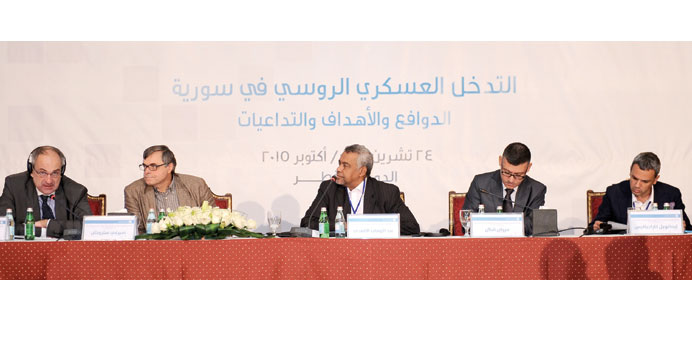Mizin (left) speaking at the symposium yesterday as Stroken, Abdelwahab el-Affendi (Doha Institute for Graduate Studies), Kabalan and Emmanuel Karagiannis (King’s College, London) look on. PICTURE: Shaji Kayamkulam
By Ramesh Mathew
Staff Reporter
Russia’s military intervention in Syria could be seen as an attempt to increase its influence on global affairs, akin to the dominant role played by Soviet Union in the past, an expert observed in Doha yesterday.
Azmi Bishara made the observation while addressing an academic symposium, “Russia’s Military Intervention in Syria: Motives, Objectives and Repercussions”, organised by the Arab Centre for Research and Policy Studies (ACRPS).
A number of experts from Russia, the Arab world and the region deliberated Russia’s decision to intervene directly in the conflict in Syria at the event.
Opinions and perceptions varied among speakers at the symposium even as most of them expressed hope that there was still room for a dialogue to end the ongoing crisis in Syria.
Initiating the discussions, policy expert and ACRPS director Bishara said this was the first time the Russians were openly striking anywhere “beyond their natural boundaries” and recalled the positions taken by President Vladimir Putin since his arrival on the world scene in 1999.
He noted that there was a growing perception that Russia’s support to the Bashar al-Assad regime was in response to the backing the Syrian president gave to Russia on issues such as Kosovo, Georgia and Ukraine.
Further, the ACRPS director said the increase in the Russian defence budget since 2010 showed that the country was making some bold and determined attempts to regain the position the Soviets had once enjoyed in international polity. For 10 years, Russia has earmarked almost $72bn per year for the modernisation and strengthening of its defence forces, he added.
Speaking later, senior researcher and deputy director at the Moscow State Institute of International Affairs Victor Mizin said Russia was determined to see that the ongoing military intervention in Syria does not turn out be a fiasco, like what happened in Afghanistan.
The policy researcher said had they been sincere to end terrorism, the Western countries should have rallied along with Russia to fight the ongoing military strikes in Syria against ISIS.
While insisting on the need to forge a common front against terrorism, the speaker felt the exit of the present regime in Syria would not only lead to a political vacuum in the country but might also give way to another round of uncertainty and hostility between warring groups for supremacy.
However, he noted that there was still hope for a settlement in Syria if there was enough commitment and determination among leaders at the global level.
Moscow-based geopolitical analyst Sergei Strokan highlighted the need to form a global alliance against ISIS, citing the chances of terrorism surfacing in some countries lying to the south of Russia, which were once part of Soviet Union.
The speaker said the “negative” reaction of the West to Russia’s call for a unified stance against terrorism was sending confusing signals to the rest of the world.
ACRPS associate researcher Marwan Kabalan acknowledged that analysts and political researchers in the Middle East had failed to read emerging developments in the region and see the arrival of ISIS and similar groups.

